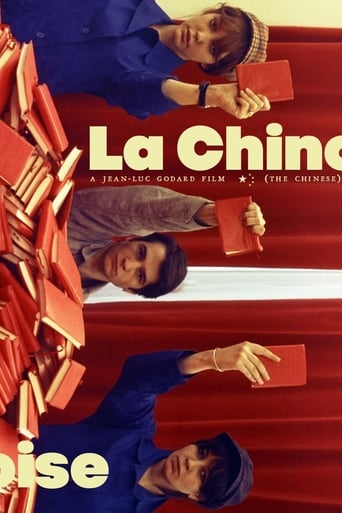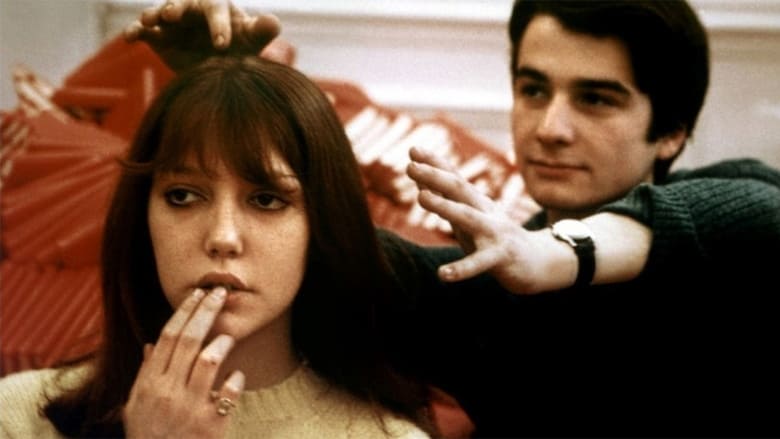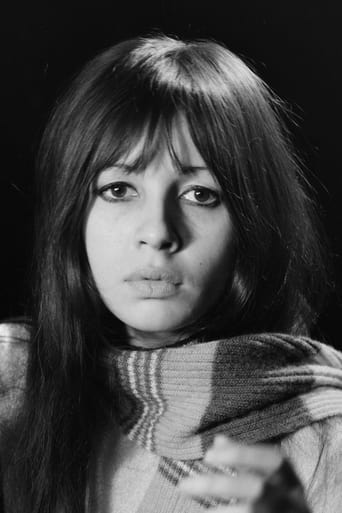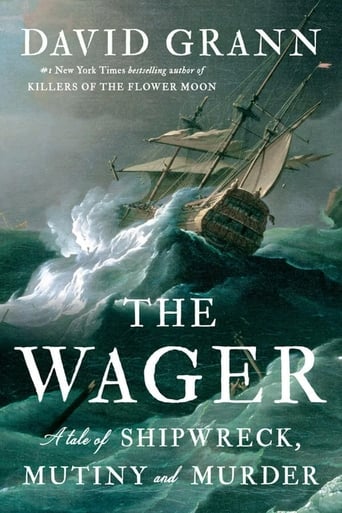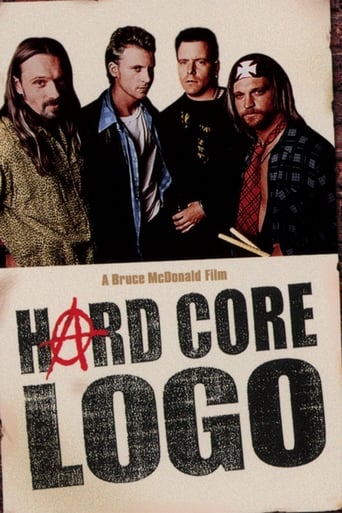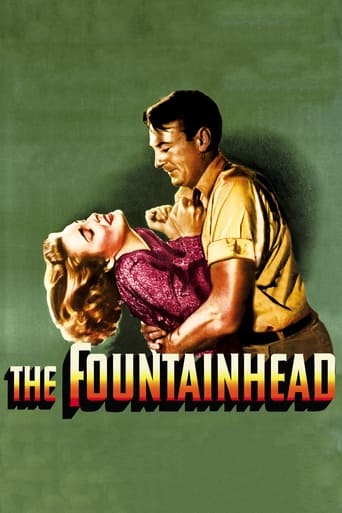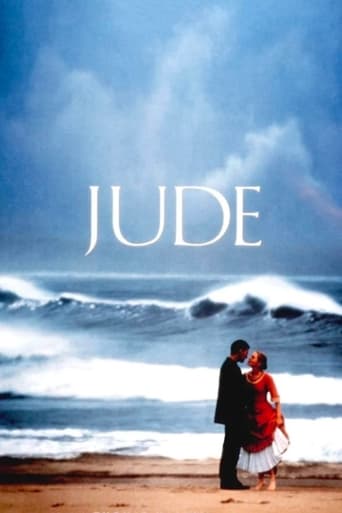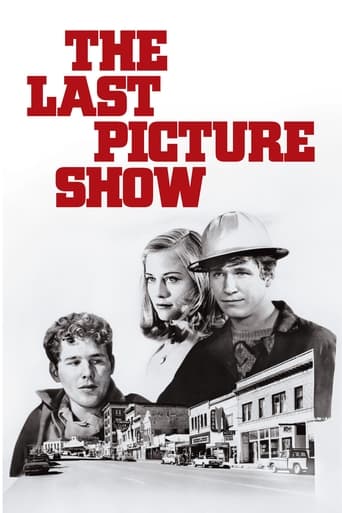La Chinoise (1968)
A small group of French students are studying Mao, trying to find out their position in the world and how to change the world to a Maoistic community using terrorism.
Watch Trailer
Cast


Similar titles
Reviews
Touches You
Sorry, this movie sucks
Although I seem to have had higher expectations than I thought, the movie is super entertaining.
The story, direction, characters, and writing/dialogue is akin to taking a tranquilizer shot to the neck, but everything else was so well done.
In 1966, Jean-Luc Godard made the acquaintance of some young members of the French Left who felt a strong pull towards Maoism. By looking to China, they sought to escape the traditional division of the French Left into supporters of the Soviet Union, which had lost its revolutionary fervour, and Trotskyist parties, which were impotent. (Of course, at the time the West was still generally unaware of the horrific toll of Mao's policies.) Godard, whose sociological curiosity and political engagement was strong in these years, decided to study this phenomenon, and the result is LA CHINOISE. While Godard would eventually go on to make a few films that were so didactically political that one felt bludgeoned by the message and watching was no fun, this one surprised me in how entertainingly its plot played out and how astute its observations were.In a Parisian flat borrowed for the summer while one member's parents are away, a group of young radicals lodge together and fancy themselves a revolutionary cell. Chief among them are Guillaume (Jean-Pierre Léaud), Véronique (Anne Wiazemsky) and Yvonne (Juliet Berto). They read daily from Mao, decrying the Soviet Union and French society, and practicing their demagoguery for their occasional attempts to bring their message into the streets. Gradually, they come to decide that terrorism is necessary to achieve their goals, and they gang up on the sole dissenter from violence and kick him out of the flat. Francis Jeanson, a French academic and opponent of the war in Algeria, as well as Wiazemsky's actual thesis adviser, appears as himself in a scene where he attempts to dissuade Véronique from violence, asking just how much support from the oppressed masses does this sheltered girl think she has.As desperate as he was for a cause to uphold, I don't believe that Godard really committed himself deep down to Maoism or revolutionary socialism in general. His bitterness against the staid French status quo is palpable, and he likes how the French Maoists at least recognized a need for change, but LA CHINOISE affectionately criticizes its subjects more than it celebrates them. Rather than presenting Maoism convincingly as a way forward, LA CHINOISE ultimately suggests it was only the most recent expression of the drive to rebellion that appears afresh in every young generation. While these characters are Maoists, he borrowed the basic outlines of the plot from Dostoyevsky, who described a set of young radicals well before Marxism-Lenin. The filmmaker underscores how such idealistic young people takes themselves too seriously, he shows their adoption of Maoist art as a sort of fashion statement, their use of Maoist terminology as the latest hip slang.There are some fun touches here, the acerbic humour and amusing dialogue that Godard brought to his storytelling. The occasional use of Brechtian distancing techniques, like when Guillaume suddenly breaks character and talks to cinematographer Raoul Coutard, lead the viewer to reflect more on what is happening. And in spite of Godard's revolutionary sentiments, LA CHINOISE maintains a dialogue with the film tradition (cinephiles will chuckle at the avant-garde snippet that occasionally pops up in the soundtrack, a clear nod to Ingmar Bergman's film PERSONA).Like Godard's early colour films, this is also a visual pleasure. Much of the first half of the film seems to me a study of faces: Léaud's famous expressiveness, Wiazemsky's quirky overbite and distinct way of moving her mouth to the left when talking, and Berto's sad eyes. The set design is clever, full of little details. (It's great that the film has been re-released in Blu-Ray, so viewers can appreciate all those touches in high-definition.) I wouldn't recommend LA CHINOISE to someone who had not seen Godard's earlier films, but I rate this pretty highly among his body of work and believe that it will impress anyone who has developed a love for this auteur's style.
"Only the guy who isn't rowing has time to rock the boat." - Sartre Fyodor Dostoevsky wrote "Demons" in 1872, a novel about a group of young radicals in pre revolutionary Russia. Based loosely on Dostoevsky's tale, Jean-Luc Godard's "La Chinoise" watches as five young activists spend their summer vacation in a small apartment belonging to "wealthy factory owners who are out of town". Here they study Mao's "Little Red Book", a collection of writings on Chinese communism."La Chinoise's" first two act take place almost entirely within the group's apartment. Red, blues and whites – the colours of the French national flag – dominate. Stacks of Maoist literature line the walls and plastic toys litter the floors. A radio blasts Chinese news reports and occasionally silly Maoist pop songs. We're then introduced to Guillaume (Jean-Pierre Leaud), Veronique (Anne Wiazemsky), Yvonne, Henri and Kirlov, the only character named after a corresponding character in "Demons". It is implied that Veronique's relatives own the apartment. The kids are all in their late teens and early twenties, some prostitutes, others timid intellectuals, others related to bankers. "I'm ashamed of my wealth," Veronique says."La Chinoise's" aesthetic is now familiar, but back in the 1960s was deemed novel. Told in stylised bursts, this is a confusing amalgamation of agitprop, reality TV, documentary, cartoon, Brecht and conventional fiction. Like most of Godard's films, things only coalesce and take on power with repeated viewings. Godard hoped such a style would "shatter bourgeois aesthetics!", but of course the opposite proved true. Instead of a militant aesthetic (what he called "socialist theatre") which radicalised viewers and instigated change, audiences turned up their noses to what they deemed elitist and incomprehensible.Ironically, the film itself is about "clarity" and "gibberish". "We should replace vague ideas with clear images," one sign reads, whilst another kid states that it is "necessay to bring about the subjective and objective conditions that make revolution possible and render the use of force feasible". In short, they want to overthrow capitalism. The problem? How and what then? "There are different kinds of communism," one kid says, "different shades of red to choose from." Russian Communism, he then points out, does not truly incur the wrath of imperialist America. Chinese Communism, on the other hand, warrants the shelling of Southeast Asia and the escalation of fighting in Vietnam. Surely Maoism is thus "the right way"; a bigger threat to the status quo.This certainty is contested throughout the film. The kids are shown to be narrow-minded, sheltered, annoying, blind to ideological contradictions and nuances, uninterested in anything outside Mao and lost in their own private bubbles. They dream whilst the world spins, treating political ideology as just another pair of goofy consumer sunglasses to be picked up and discarded. On the flip side, these youths are sincere and Godard thoroughly sympathises and even agrees with them; after-all, history is littered with pampered folk like this getting the ball rolling on many human rights issues. Takes time, but still; you can't fight stupid.Godard title is a pun on the phrase "speaking Chinese" (speaking nonsense or gibberish), and also an allusion to "The Italians", a leftist cell beholden to the writings of Antonio Gramsci. Godard's cell, of course, is obsessed with Chinese rather than Italian Communism, they just struggle to morph theory into action. As the film progresses, they also become more militant. "We must suppress undesirable elements that compromise the whole," one morbidly states. Another makes a good point: "revolution costs money but the armies who put them down are free." Guillaume then learns the concept of "struggling on two fronts", which Godard turns into a specific metaphor: the revolution fights itself, its own failings and limitations, as much as the enemy.Veronique, the only character to come from wealth, eventually hatches a plan to both assassinate a visiting Soviet Minister and bomb a university. "Cut off one finger to save ten," her buddies nod like robots, and then: "We must participate in changing reality. Revolutions require terror!". In the film's best scene, Veronique discusses her plans with Francis Jeanson, a real life philosopher who was once arrested for supporting Algerian independence movements (Algeria was once a colony ruled by the French Empire). Jeanson sympathetically stresses nonviolence, seeks to talk Veronique out of her blood-lust, but she doesn't listen. If you're looking to change the rules, why start by abiding by them? Godard's shot composition is ominous: Veronique's hurtling toward history, a history to which Jeanson's back is firmly turned to.The film ends with Veronique's terrorist attacks comically failing. The group then disbands, one member committing suicide, another quitting his job, another emigrating. "Sound and fury scare me," he admits, gobbling down food in a parody of consumerism run amok. As for Guillaume, he's enveloped back into the folds of capitalism, selling fruit and metaphorically assaulted by rotten vegetables. Occasionally he visits the "Year Zero Theatre", in which he symbolically chooses who to free: a plump woman, or a skinny girl, both knocking on an invisible door. Year Zero, of course, alludes to the group's longed for day of victory. "All roads lead to Peking", a sign says, but it's a long walk. "I thought I made a leap forward," Veronique admits, "but it was but a small, timid step on a long march." The group's apartment is then sealed shut, and with it a zeitgeist, Veronique's relatives excavating rooms and unceremoniously dumping Mao's red books. Silly girl, they think. Then came 1968, in which the May day strikes (the Tet Offensive occurred weeks earlier) promptly made a fortune-teller of Godard. Here, over 11 million French workers/students took to the streets, 22 percent of the country striking. France's economy crawled to a halt. This little mini-revolution ended two weeks later, partially betrayed, no less, by the French Communist Party. Henceforth Europe's left-wing became increasingly right. Godard would slip into depression.8.5/10 – See Fassbinder's "Third Generation".
With this film, Godard applies his attention to the awakenings of Maoism and other left wing groupings among the western youth, which became highly dramatic in France and elsewhere just one year later. In this regard, he attempts to press forward an explicit political statement with the story of 5 young students, living together in a commune and studying Mao's bible. In doing so, Godard establishes a very interesting position within commercial cinema - for one thing, by siding with the political line of the Marxism-Leninism, or rather putting its policy up for discussion, for another thing, by giving this film an utterly unspectacular structure which is mostly based on language and reasoning discussions. For long periods, this film has the character of a Brechtian teaching play and does not show the result of thought process, but the fumbling and unsure, often awkward gait of thinking itself between the grueling influences of the exterior environment, politics and history, which Godard quotes as signs and images of pop culture. It's probably not Godard's most engaging film, but it's certainly very intriguing, given the course of history after this film was made.
In Japan, La Choise was put on the market as DVD in last year. Although I obtained to view it after some hesitation, the work by Godard in 1967 was brought to very beautiful digitized pictures. About four decades ago, I remembered having seen the poster that was stuck on the wall filled in the graffiti of a political slogan in the movie research club room of an university, although I did not view this work itself. In the poster, Anne Wiazemsky of makeup of Red Guard, wearing the Mao cap and the Mao jacket, hanged up Little Red Book highly with the right hand. The background of the poster was cranberry red. In this movie, the color of white and red is used for symmetry as metaphor. Former suggests bourgeois communism in Western countries, and latter suggests Maoism.A movie starts in the white mansion house in the Paris suburbs. To study Maoism, the five women and men congregate to live a communal life in residence with a white interior and exterior wall that elaborated the intention on the furniture of a bourgeois hobby. We scoped out the setting for Beijing Weekly Report, Mao cap, and much Little Red Book. Those movie property emboss petite bourgeois radicalism. Although Godard was disgusted with the bourgeois Western communism, zeitgeist at the time shared a similar perspective between the young intelligentsia and students having the leftist ideology of Western Europe. The energy in such a spirit of the age was committed to the Maoism, and praised the Cultural Revolution. In Western countries, it was only catastrophe and It is few persons' sacrifice and ended. When on the train Anne Wiazemsky and Professor Francis Jeanson debate the revolution, she sits down toward a direction of movement against the background of the train window, but he sits down conversely. We know the history that the train goes to the destination of violence, destruction, and genocide. Although Godard in those days must have sat down on the same seat of Anne, of course, probably, he must have got off without going to the terminal station. The scene of the conversation in that train suggests ambivalence of Godard himself. In 1968 of the next year when this film-making was done, we encountered The Paris May Revolution. It passed away after febrile delirium. Almost all young intelligentsia and students of those days in the Western countries as well as Godard must have got off. I did so.When about four decades have passed away, we now know The Cultural Revolution in China as a struggle for power at Beijing Zhongnanhai, Vietnam War as a southing to occupy by North Vietnam, a genocide in The Cultural Revolution in China, a genocide by the Pol Pot Administration of Maoism, and also collapse of communism itself. I can now view this movie calmly.

